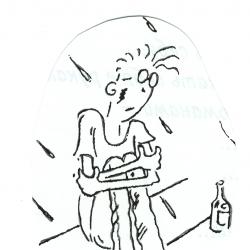Conjugation of the verb etre in French. Etre and avoir teaching material in French (grade 5) on the topic. Examples from other languages
The verb être is one of the most irregular verbs of all French verbs. If verbs had a gender, it would be feminine - there is no logic in its conjugation;), and he inherited this property from his Latin roots. But he also has a burdened heredity: the conjugation of être is based on not one (!!), but three whole Latin verbs. Three, Carl! Well, well, if not three - two and a half. But not alone!
This explains why être has such different bases at different times. Well, the truth is - who will say that these are conjugation variants of the same verb: je suis, je serai, je fus, j "ai été ?! That's right - no one.
But I'll explain everything to you now! :) And everything will become clear.
Since there is no need to talk about the logic of conjugation here, we have no choice but to plunge into the etymology of être - only it will give us the key to understanding and remembering its conjugation.
In classical Latin, there was an equally irregular verb "to be", which in the infinitive sounded like this: esse. After the fall of Rome and the rise of vernacular Latin, it became the verb essere. Already familiar, right? (In Italian, it has survived in this form to this day). After some centuries, this verb acquired almost its final form. This is how it was recorded in the second edition of the dictionary of the French Academy of 1664 issue:
For about a thousand years essere he turned into estre. But by this time, the letter “s” in this position had long ceased to be read, so the spelling reform fixed this fact in the spelling of the letter: in the next, 3rd edition of the dictionary of the French Academy of 1740, this word had already acquired a modern spelling. Circumflex recalls that there was once a dropped letter "s" nearby.

We have dealt with the infinitive. Let's take a look at conjugations. Here is the present tense of the indicative mood.
It immediately becomes clear where the legs grow from. There are even forms that have not changed at all. The same Latin verb gave in modern French the subjunctive (je sois), the future tense (je serai) and the conditionnel (je serais).
The perfect form of the verb esse, fui, provided the basis for the conjugation of être in the passé simple. Let's compare the ancient form of the verb with the modern one:
Well, it is clear where the dog rummaged.
And finally, another Latin verb - stare - left its traces in the conjugation of être. Its meaning - to stand, and not only in the sense of being in an upright position, but in general to be - is quite close in meaning to esse. This verb gave rise to three forms of conjugation in Old French:
- in imparfait: j "estois (in modern French j" étais),
- in the present participle: estant (today it is étant),
- and in the past participle: esté (modern été)
This verb - stare (to stand) - by the way, is very tenacious. It came to all our languages from Proto-Indo-European and, as a result, it is present in the same meaning in many languages from this family: in English it is stand, in German stehen, in Italian without change - stare, and even in Russian it is "stand" - do you see the resemblance? Even the word "stop" has the same roots!
As in most other European languages, in the French version it is not possible to omit the verb to be, which, on the contrary, is very typical for the Russian language in phrases like: he is cultured, she is at home, they are in the mountains. A Frenchman, an Englishman or a German in these cases will definitely say: he is strange, she is at home, they are in the mountains. Thus, the verb to be (is) is extremely important for any native speaker in Europe. At the same time, in German, in this connection, we will deal with the verb sein, in English - with the verb to be, while in French there is a verb être.
The aforementioned French verb être is used in the case of describing states (être curieux - to be curious, être petit - to be small), when indicating the occupation (être étudiant - to be a student, être médecin - to be a doctor), and is also widely used in the process of conjugation in complex temporary forms of fifteen verbs (devenir (to become), naître (to be born), aller (to go), etc. - intransitive verb units, the semantics of which are associated with movement or state - Je suis allé (I left.)).
The conjugation of the verb être itself is as follows:
je suis adroit - I am dexterous
tu es adroit - you are dexterous
il est adroit - he is dexterous
elle est adroite - she is dexterous
nous sommes adroits - we are dexterous
vous êtes adroits - you are dexterous
ils sont adroits - they are dexterous
elles sont adroites - they are dexterous (female)
In turn, the negative form with the verb être will be formed according to the following pattern: ne + être in one of its forms + pas. - n'es pas (You are not); n'êtes pas (You are not); ne suis pas (I am not), etc.
The order of constructing interrogative constructions with the verb être will depend on the specific situation and the purpose of the question being asked (general or special), as well as on the recipient (whom they are addressing). — Suis-je? est elle? Sont-ils? Est-ce qu'elle est? Elle est? Qui est elle? (Who is she?), etc.
Moreover, if être is used to fix the occupation or profession, then we will have to omit the article before a certain noun:
je suis artiste - I am an artist;
tu es pianiste - you are a pianist;
il est chef d'orchestre - he is a conductor;
elle est étudiante - she is a student;
nous sommes grimpeurs - we are climbers;
vous êtes médecin - you are a doctor;
ils sont juges - they are judges;
elles sont paysannes - they are peasant women.
However, in the case of placing a definition with a noun, the use of the indefinite article -Vous êtes un mauvais concepteur (You are a bad designer) is observed; Elle est une bonne fille (She is a good girl).
You also need to take into account the fact that the adjective placed after être must agree with the direct control word in its gender, as well as in number. - Je suis intelligent (-) - m.p. (I'm smart). Ma fille est intelligent (e) - f.b. (My daughter is smart). Son ami est gras (His friend is fat). Ils sont adroit (s) - pl. h. (They are skillful). Thus, the masculine will be reflected in the use of the zero ending, the feminine in the addition of the inflection -e, and the plural in the use of the ending -s.
Interestingly, the French language is very rich in all sorts of set expressions in which the verb être is actively used: être cool (to be “cool”); être islamiste (to be an Islamist); être stable (to be stable); être insupportable (to be unbearable); (avoir le droit) d'etre idiot (have the right) to be an idiot)); être fastidieux (to be boring); être peureux (to be cowardly); être nouveau (to be new); être héros (to be a hero), etc. The ability to use them correctly in your speech can make it richer, emotionally and stylistically rich.
In French, the verb être (to be) is used to describe a phenomenon, the state of an animate or inanimate object, to determine the type of activity, occupation, profession. The verb être is also used as an auxiliary when conjugating other verbs in compound tenses in French.
The verb être belongs to the third group of verbs and has special forms of conjugation in almost all tenses. In this case, either the original root of the verb or a morpheme different from the root of the verb is used as the basis. As a rule, the conjugation of the verb être is memorized. The following is the conjugation of the verb être in the present (Présent), past completed (Passé composé), past incomplete (Imparfait), and future simple (Futur simple).
Usually in sentences the verb être is not translated into Russian. For example, the expression "il est directeur" in Russian will sound like "he is a director", and not "he is a director", since the verb "to be" in combination with the names of professions, descriptions of states, etc. in Russian, as a rule, is omitted. Unlike the Russian language, in French the presence of a subject with an indication of the occupation, description, etc. always presupposes the presence of the verb être:
Nous sommes enfants - We are children.
Pierre, tu es très intelligent - Pierre, you are very smart.
La maison est grande - The house is big.
In some constructions in French, the verb être may either not be translated into Russian at all, or be translated by other verbs that are suitable in meaning in this particular situation. For example:
ton stylo est sur la table - your pen is on the table OR your pen is on the table;
mon complet est dans l "armoire - my suit is hanging in the closet OR my suit is in the closet;
nous sommes en huitième - we are in eighth grade.
The verb être is used as an auxiliary in conjugation of all reflexive verbs.(se séparer, s "arrêter, etc.) and 15 verbs in compound tenses. These include the so-called "intransitive" verbs denoting a state or movement:
aller (to go), arriver (to arrive), descendre (to descend), devenir (to become),
entrer (to enter), monter (to rise), mourir (to die), naître (to be born), partir (to leave),
rentrer (return), rester (stay), revenir (return), sortir (leave),
tomber (fall), venir (come).
For example: je me suis arrêté - I stopped; je suis venu - I have come; elle est sortie - she went out.
A participle formed from a conjugated verb will agree in number and gender with the subject to which it refers. For example: il est venu, nous sommes venus, elles sont venues.
Due to the fact that some of the 15 verbs listed can have different meanings, such verbs can be conjugated with the auxiliary verb avoir:
Compare: il est monté - he rose; il a monté sa valise dans l'armoire - he lifted (put) his suitcase in the closet.
The auxiliary verb être is replaced by avoir also if there is an object in the genitive case, i.e. when the conjugated verb becomes transitive:
il a monté l'escalier - he went up the stairs.
The French verb "être" translated into Russian means "to be". This verb is part of the third group of verbs, therefore it has special conjugation forms in all tenses. For this, the original root of the verb is taken, or the verbal morpheme. For competent speech, these forms must be memorized.
The verb "être" is used as a semantic verb when defining a profession, status, type of activity, as well as when describing a certain phenomenon or state of an object.
Usually, in sentences where the verb "être" carries a semantic load, it is not translated into Russian. For example:
. Je suis professeur. - I'am a teacher. (Not "I am a teacher")
. Elle est tres riche. - She is very rich.
. Le chat botte est mon heros aimé. Puss in Boots is my favorite character.
In French, there are a number of turns in which the verb "être" can also be omitted in translation, or translated by another verb that correlates in meaning with the main idea of the sentence in which it is used. For example:
. L'auto est à côt é de la maison - A car near the house. The car is parked near the house.
. Les serviettes sont dans la commode. - Towels in the dresser. The towels are in the dresser.
. Il est jardinier. - He's a gardener. He works as a gardener.
In addition, the verb "être" is one of the auxiliary verbs in French. So, it will be an auxiliary verb when conjugating all reflexive (pronominal) verbs. The participle (participe passé) formed during the conjugation of the semantic verb must be consistent in number and gender with the subject. So:
. Il s "est réveillé. - He woke up.
. Elle ne s'est pas lavee. She didn't wash.
It is worth paying attention to the fact that the masculine participle is used in the first sentence, and the feminine participle in the second. This is evidenced by the added "e" in the participle of the verb "se laver".
Also, the verb "être" will be auxiliary in the formation of compound tenses with "intransitive" verbs denoting movement or state:
. naître - to be born
. mourir - to die
. tomber - to fall
. aller - go, go
. arriver - come, arrive
. partir - leave, leave
. venir - come, arrive
. survenir - appear, meet
. apparaître - to appear
. sortir - exit
. and others
For example:
. Pouchkine est né en 1799. - Pushkin was born in 1799.
. Le train est arrivé sur le quai. - The train has arrived at the platform.
However, the verb être can be replaced by the verb avoir if the verb is followed by a direct object (without a preposition) in the construction of the sentence. Then the verb becomes "transitive":
J'ai sorti mon porte-monnaie. - I took out my purse.
The verb être can also be used in fixed phrases. In the third person singular, in combination with the pronoun il, it forms an untranslatable impersonal phrase il est, which is used mainly to denote time. For example:
. Quelle heure est-il? - What time is it now?
. Il est quatre heures. - It's four o'clock.
The use of the verb "être" is very common in French, both on its own and as an auxiliary in the formation of tenses, so be careful when using it. If you choose the wrong form, you can unwittingly distort your own thought.






